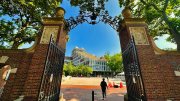The Trump administration has indicated that it will restore many of Harvard’s research funds, after a federal judge ruled last week that the government’s decision to withhold more than $2.2 billion in funding was illegal. A University spokesman confirmed that Harvard has begun to receive notices of reinstatements on awards that were previously terminated from a range of federal agencies.
As of Wednesday, no payments on the awards had yet been made, though the process can take several days.
Harvard sued the federal government in April after the administration announced that it was suspending billions of dollars in research money as punishment for incidents of antisemitism on campus. Ruling in summary judgment on September 3, U.S. District Judge Allison D. Burroughs determined that the government had unlawfully retaliated against Harvard for exercising its First Amendment rights and had “used antisemitism as a smokescreen for a targeted, ideologically-motivated assault” on Harvard and other universities across the country.
Burroughs ordered all terminated funding restored, and the White House immediately vowed to appeal the decision. But the administration has not made clear when or where it might file an appeal, and the notices of reinstatements received by the University indicate that it intends to abide by the court’s order for the time being.
“The order is pretty direct. They have to restart the funding,” said Noah Feldman, the Frankfurter professor of law at Harvard Law School, in an interview conducted before news of the reinstatement notices was made public.
If the administration fails to reinstate the grants, Feldman said, Burroughs would have grounds to impose various sanctions, such as holding the administration or its lawyers in contempt of court, imposing fines, or directing individual government employees to pay back the money owed.
Even if federal agencies proceed with paying out research funds to the University, the Trump administration retains several options for contesting the district court order. The government could file a full appeal before the U.S. Court of Appeals of the First Circuit and let the case unfold at a regular pace. Or it could ask the Supreme Court to review the district court’s decision in an expedited process without waiting for the federal circuit court to act.
Whatever the government’s next steps may be, the district court ruling was “an extremely clear and definitive victory for Harvard,” according to Feldman. “The judge made it very clear that acts of retaliation against Harvard for its exercise of its free speech were going to be ruled unlawful by her.”
Harvard remains engaged in negotiations with the Trump administration, which has also threatened to cut off the University’s ability to enroll international students, launched a civil rights investigation, and most recently initiated a review of the University’s patent compliance. Harvard has made voluntary changes to address some of the government’s stated concerns, by suspending controversial academic programs, merging its gender equity and nondiscrimination offices, and adding programming about antisemitism to its anti-harassment training modules, for example.
In a September 6 article in The New Yorker, Feldman’s colleague, Watson, Jr. professor of law Jeannie Suk Gersen, expressed concern about whether Harvard’s victory in the federal funding lawsuit will ultimately deter the administration from pressuring institutions of higher education.
“Now that a case has vindicated the legal principles that Harvard has been asserting on behalf of universities,” wrote Gersen, “the question is whether it will make a practical difference in insuring free speech and free inquiry at the university.”








